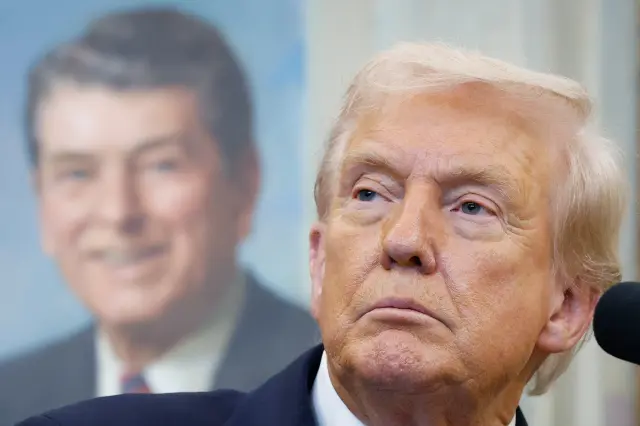-
How Stablecoins Can Help Criminals Launder Money and Evade Sanctions - 28 mins ago
-
Steelers Have Already Reached Decision on Mike Tomlin’s NFL Future: Report - 31 mins ago
-
Dodgers Predicted to Make ‘Villainous’ Signing at Winter Meetings - about 1 hour ago
-
Benin Coup Attempt to Oust Talon Has Been Foiled, Interior Minister Says - about 1 hour ago
-
Virginia Tech, James Franklin Looking to Make Surprising Coaching Move - 2 hours ago
-
Presidential Power Gets Tested Before Supreme Court After Long Conservative Project to Shrink Agencies - 2 hours ago
-
Student Loan Delinquencies Surge to Alarming Levels—Credit Score Report - 2 hours ago
-
Not All Targeted Killings Are the Same. Hegseth’s Boat Strikes Are Illegal. - 3 hours ago
-
Congress Rewrites Hemp Definition, Reshaping Cannabis Rules - 3 hours ago
-
Pacific Palisades residents preserve community with block party - 3 hours ago
Trump’s Foreign Policy of Short-Termism | Opinion
As the Trump administration’s second term approaches a full year in office this coming January, it’s as good a time as any to ask two wonky but fundamental questions: Does President Donald Trump have a grand strategy? And if so, what is it?
To his most die-hard supporters, Trump’s entire foreign policy doctrine can best be described as “America First,” a phrase so open-ended and vague that it means different things to different people. Others have recycled Ronald Reagan’s infamous “peace through strength” doctrine, asserting that Trump aims to project U.S. military and economic power against adversaries, competitors and allies alike to meet core U.S. security objectives and maintain U.S. supremacy. Still others have termed Trump’s foreign policy as one of reciprocity, whereby Washington seeks to rejigger the global political and economic order to make it fairer for the United States.

Yet all of these definitions give Trump too much credit and depend on the assumption that he’s working off a unified, sophisticated plan for how to meet policy goals. Thus far, the opposite is the case. If Trump has any strategy at all, it’s often contradictory, where goals are competing with each other and officials in the U.S. inter-agency are confused about which ones have priority. Trump’s tariffs on India, for example, are designed to pressure Indian Prime Minister Narendra Modi into stopping the purchase of Russian oil, which in turn would squeeze Moscow financially and cause Russian President Vladimir Putin more difficulty in financing the war in Ukraine. But those same tariffs also throw a wrench into U.S.-India trade talks, have forced New Delhi into re-thinking its tough China policy and affords the Indian security establishment more reason to bet on multi-alignment with all the world’s great powers.
Trump is fixated on the short-term. He pursues quick solutions and dramatically claims success, even if the problems he’s trying to solve still fester far into the future.
Iran’s nuclear program is an apt illustration. Trump’s decision in mid-June to bomb Tehran’s three major nuclear facilities, upending his direct diplomacy with Iran in the interim, was categorized by the White House as an unprecedented military success. Trump, Defense Secretary Pete Hegseth and Director of National Intelligence Tulsi Gabbard all declared that Iran’s nuclear program was “obliterated,” a word that connotes an unadulterated, permanent achievement.
In reality, the Iranian nuclear issue wasn’t solved as much as it was kicked down the road for a few years. The International Atomic Energy Agency said that Iran retains most of its high-grade enriched uranium stockpile. Meanwhile, Iran is reportedly rebuilding its missile launching capability. Work is being done on another underground tunnel which could potentially hold more centrifuges. And Iranian Supreme Leader Ayatollah Ali Khamenei is no more interested in putting Iran’s enrichment capacity on the table for discussion now than he was before the U.S. dropped bombs. Nothing has been resolved, only deferred.
Or take Trump’s 20-point peace plan for Gaza. To Trump’s credit, the United States exhibited significant diplomatic capital to compel both Israel and Hamas to sign up for a ceasefire. Israeli forces have pulled back from major cities in Gaza, the rest of the living hostages have been released to their families and the hundreds of thousands of Palestinians in the north who were displaced can now go back to their homes—or what’s left of them. In his typical flair, Trump essentially declared mission accomplished during his October 13 speech to the Israeli Knesset and intimated that peace in the Middle East was just around the corner.
But again, Trump is spiking the football before it crosses the 50-yard line. The vast majority of Trump’s Gaza proposal hasn’t been negotiated yet. Many of the items—like Hamas’ full disarmament and Israel’s complete withdrawal—that collapsed during previous talks have been left for future rounds. There’s no resumption of Israeli-Palestinian peace talks on a final-status solution to the decades-long conflict, and Israeli Prime Minister Benjamin Netanyahu is as vociferously opposed to a Palestinian state today as he was before Hamas’ October 7, 2023 attack.
U.S. foreign policy closer to home is also instructive. Since September, the Trump administration has destroyed eight boats in the Caribbean allegedly carrying drugs to the United States, killing 34. The most recent strike occurred on October 22 in the Pacific. Trump and the Pentagon have made a big show of these operations, even as they deploy more U.S. military firepower to the Caribbean and sharpen their rhetoric against Venezuela’s autocratic president, Nicolás Maduro.
Sending missiles into boats, however, is akin to playing whack-a-mole with drug trafficking organizations that boast a huge financial motive to continue servicing a country in the United States whose demand for illegal drugs remains high. Drug traffickers are already adapting to the U.S. strikes by changing their routes, and given past practice, land and air cargoes will become more important as sea lanes are attacked. And if demand stays high and money is to be made, the trade will persist regardless of how many strikes Trump orders.
Trump is mistaking short-term wins with long-term victories—whatever helps him sleep at night.
Daniel R. DePetris is a fellow at Defense Priorities and a syndicated foreign affairs columnist at the Chicago Tribune.
The views expressed in this article are the writer’s own.
Source link




















